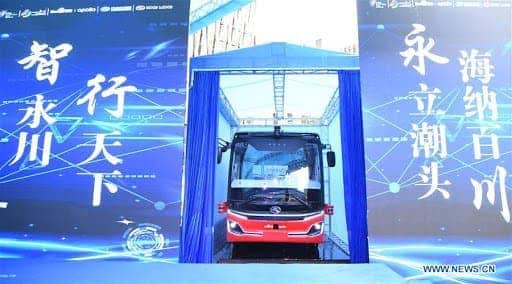Baidu Apollo Debuts the First Level-4 Autonomous Buses in China

Baidu Apollo, the open autonomous driving platform of China's internet giant Baidu, debuted the first level 4 autonomous bus in China. The company unveiled the medium-sized bus in the Chinese municipality of Chongqing, Chinese news outlet Gasgoo reports.
Baidu Apollo already holds permits to test its autonomous vehicles on public roads in Chongqing as part of its "Apollo Go" robotaxi service in China, now it will deploy self-driving buses called a "Robus."
Baidu's Robus is just over 19 feet in length and is outfitted with Level 4 autonomous driving technologies. The bus is equipped with four LiDARs, two millimeter-wave radars and seven monocular cameras, and can accommodate up to 19 passengers. The bus was jointly developed by Baidu Apollo and Chinese bus manufacturer King Long.
The fully-autonomous Robus is able to accurately stop at bus stations to drop off and pick up passengers, but can also handle more complex urban road conditions like Baidu's self-driving cars are programmed to.
One the same day the bus was announced, a test area where the autonomous buses will operate opened in Chongqing.The bus test route is located in the downtown Yongchuan District.
It contains more than 30 open road testing scenarios that are unique to Chongqing, including mountainous terrain, tunnels, bridges and highway flyovers, all of which are challenging scenarios for developers of self-driving vehicles.
Chongqing has already fully deployed a complete 5G communications road network to support autonomous vehicles and connected vehicle technology. The test area is supported by the comprehensive collaborative communications network between vehicles, roads, cloud-based data and HD maps.
The test site can support the simultaneous operations of 200 ICVs (intelligent-connected vehicles).
The Three "Robo Buses" are set to be deployed on the route to ferry passengers among seven stops. The autonomous bus route is the first of its kind in Western China. Baidu Apollo is testing smaller self-driving SUVs as part of its Apollo Go robotaxi service. At last week's annual Baidu World 2020 technology conference, the company demonstrated its autonomous robotaxi without human safety drivers on board.
With Apollo's new fully automated driving capability, the AI-powered system can independently drive the vehicle without human intervention, a breakthrough that Baidu says will accelerate the large-scale commercial deployment of autonomous driving technology across China.
Instead of using safety drivers in the Apollo Go vehicles, the safe operation of the robotaxis is backed by a 5G-powered "Remote Driving Service" developed by Baidu. It allows human operators to remotely access the Apollo Go vehicles in the case of any emergencies or in a case where the vehicle's software cannot handle the current situation.
Baidu's driverless robotaxis have already been deployed in five cities in China, including the capital city of Beijing, Changsha, Guangzhou, Chongqing, and Cangzhou. Now joining the robotaxis will be self-driving buses.
Baidu launched its Apollo project in April 2017. The open Apollo autonomous driving platform is widely regarded as the "Android of the Automotive Industry" and has grown to become the largest open-source autonomous driving platform in the world, according to
Baidu. Among the global automakers contributing to the Apollo platform are BMW, Ford Motor Co, Toyota, Volkswagen and Honda.



























